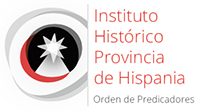Las singularidades institucionales y festivas de las cofradías gallegas del Santo Rosario durante el Barroco. Unos apuntes significativos
Palabras clave:
Cofradías, GaliciaResumen
Resumen: Las cofradías del Rosario en la Galicia Moderna (ss. XV-XVIII) constituyen un interesante campo de estudio para comprender mejor la devoción en España y percibir su complejidad y riqueza. Este breve artículo recoge una significativa muestra de estas instituciones, y pretende aportar una reflexión puntual sobre dos aspectos esenciales de la Cofradía que generan en tierras gallegas evidentes singularidades: el propio concepto de Cofradía del Rosario y de sus integrantes, y las fiestas de su Instituto.
Abstract: The confraternities of the Rosary in the Modern Galicia (ss. XV-XVIII) are an interesting field of study to better understand the devotion in Spain and perceive its complexity and richness. This short article takes a significant sample of these institutions and aims to provide a timely reflection on two essential aspects of the Brotherhood generated in Galicia apparent singularities: the concept of the Rosary Confraternity and its members and the Feasts of the Institute.
Descargas
Publicado
Cómo citar
Número
Sección
Licencia
Los autores que publican en esta revista están de acuerdo con los siguientes términos:
- Los autores conservan los derechos de autor.
- Los textos publicados en esta revista están sujetos –si no se indica lo contrario– a una licencia de Reconocimiento 4.0 Internacional de Creative Commons. Puede copiarlos, distribuirlos, comunicarlos públicamente, hacer obras derivadas y usos comerciales siempre que reconozca los créditos de las obras (autoría, nombre de la revista, institución editora) de la manera especificada por los autores o por la revista. La licencia completa se puede consultar en https://creativecommons.org/licenses/by/4.0/
- Los autores pueden establecer por separado acuerdos adicionales para la distribución no exclusiva de la versión de la obra publicada en la revista (por ejemplo, situarlo en un repositorio institucional o publicarlo en un libro), con un reconocimiento de su publicación inicial en esta revista.
- Se permite y se anima a los autores a difundir sus trabajos electrónicamente (por ejemplo, en repositorios institucionales o en su propio sitio web) antes y durante el proceso de envío, ya que puede dar lugar a intercambios productivos, así como a una citación más temprana y mayor de los trabajos publicados (Véase The Effect of Open Access) (en inglés).






